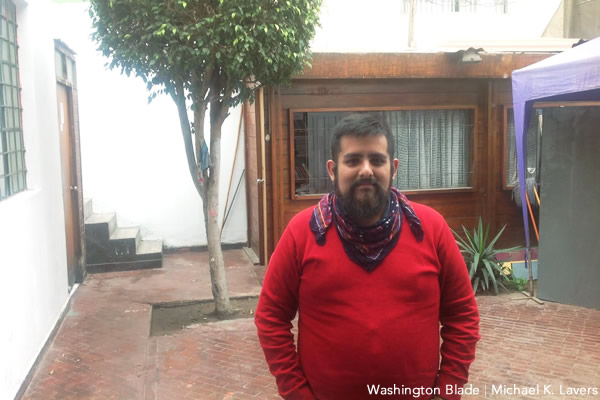homepage news
Peru ‘is not Uganda’ on LGBT rights
South American country lacks discrimination law; civil unions bill stalled
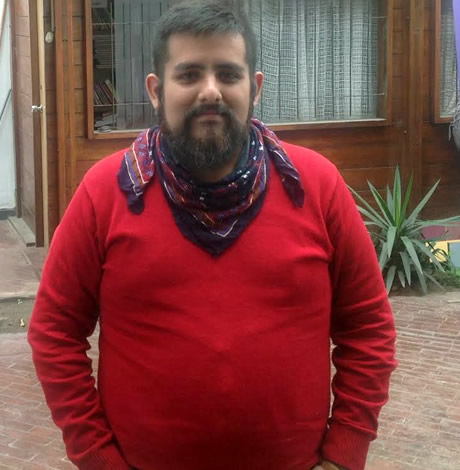
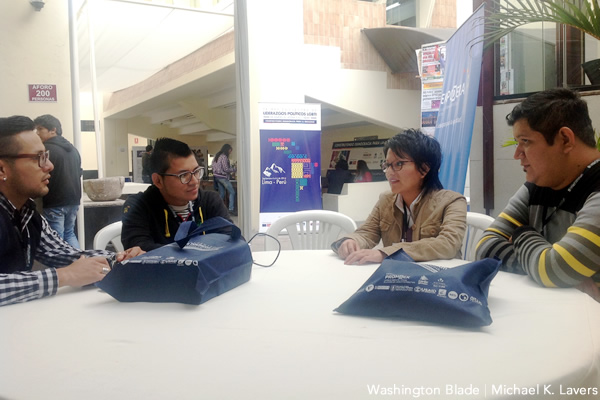
Peruvian LGBT rights advocates at a meeting of LGBT activists from Latin America and the Caribbean in Lima, Peru, on Sept. 5, 2014. (Washington Blade photo by Michael K. Lavers)
LIMA, Peru — Anita Araujo Rodríguez of the Civil Union Now Collective, a group that supports a bill that would allow same-sex couples in Peru to enter into a civil union, was among those who sought to march to the Peruvian Congress on June 6 to urge lawmakers in the conservative South American country to vote on the measure.
Araujo and other protesters were near Lima’s Plaza San Martín as they were marching towards the Peruvian Congress when police officers lobbed tear gas canisters at them. She was subsequently treated at the hospital for injuries she suffered during the clashes.
“Peru now finds itself in a very difficult situation,” Araujo told the Washington Blade during a Sept. 6 interview at a meeting of Latin American and Caribbean LGBT rights advocates that took place at Cayetano Heredia University in Lima’s Miraflores neighborhood. “We are in a fight against conservatism, against stereotypes, against manifestations.”
Araujo and other Peruvian LGBT rights advocates with whom the Blade spoke during the two-day meeting the Gay and Lesbian Victory Institute co-organized lamented the fact LGBT rights in their country lag far behind those found in neighboring Brazil and other Latin American nations.
‘No means of protection’ for LGBT Peruvians
Congressman Carlos Bruce, who came out as gay in May, last year introduced a civil unions bill amid criticism from Lima Archbishop Juan Luís Cipriani and other leading Peruvian religious figures and politicians. Congresswoman Martha Chávez, a supporter of former Peruvian President Alberto Fujimori who came to power in 1990, and Congressman Julio Rosas, who is a pastor from the city of Huánuco, proposed their own measures as a way to block any potential vote on the out legislator’s measure.
Public Defender Eduardo Vega Luna and Mario Vargas Llosa, who won the Nobel Prize in Literature in 2010, are among those who have backed Bruce’s proposal. In spite of this support, a poll last year found 65 percent of Peruvians oppose any efforts to allow same-sex couples to enter into a civil union.
President Ollanta Humana during his 2011 election campaign promised Cipriani on Peruvian television that he would not approve abortion and what Giovanny Romero Infante, executive director of the Homosexual Movement of Lima, described to the Blade as “any type of right for homosexual couples.”
Bruce and others conceded the civil unions bill is unlikely to pass in the Peruvian Congress.
“It is very worrying that members of Congress that have spoken to us feel the need to present a level of discourse that leaves much to be desired,” Gabriela Zavaleta Vera of the Civil Union Now Collective told the Blade during the Lima meeting. “There have been many homophobic statements, many statements that denote a lot of discrimination and these are based on ignorance. This does not reflect how much we want to move forward as a society.”
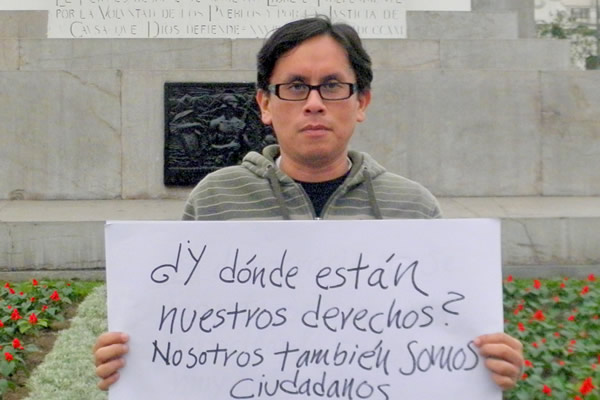
Peruvian LGBT rights activist Antonio Capurro holds a sign that reads “And where are our rights? We are also citizens.” (Photo courtesy of Antonio Capurro)
Other advocates with whom the Blade spoke in Lima stressed anti-LGBT discrimination and violence remain serious problems throughout the country.
Peruvian law does not ban anti-LGBT discrimination. Lawmakers last year voted overwhelmingly to remove sexual orientation and gender identity and expression from a proposed hate crimes law.
Marxy Condori Marín, a lesbian activist from the city of Arequipa, told the Blade she would not come out at work because her boss would fire her because of her sexual orientation.
“There are not any means of protection for our community,” she said.
The issue is even more acute for trans Peruvians.
Luisa Revilla, a trans advocate from the city of Trujillo, told the Blade many trans people work in hair salons or become prostitutes because they do not have access to any other employment opportunities. Miluska Luzquiños, another trans advocate from the city of Lambayeque, added those who are kicked out of their homes as teenagers because of their gender identity and expression see prostitution as “the only option” available to them.
“Unfortunately trans girls and trans women don’t have the opportunity to be other things,” said Revilla.
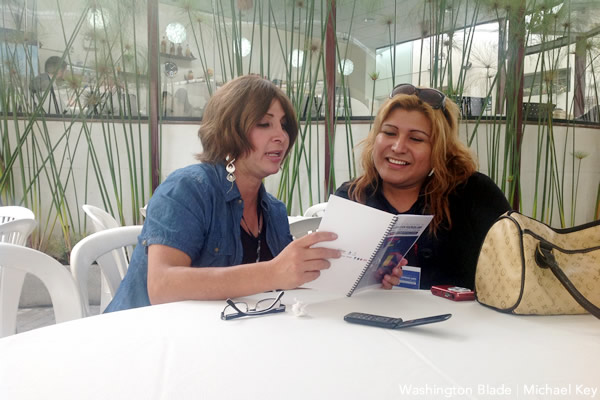
From left; Luisa Revilla and Miluska Luzquiños, two Peruvian transgender advocates, during a break at a meeting of LGBT activists from Latin America and the Caribbean in Lima, Peru, on Sept. 5, 2014. (Washington Blade photo by Michael K. Lavers)
Bruce acknowledged to the Blade during a Sept. 4 interview that insecurity and homophobia “exist throughout the country.” He also said police, prosecutors and other officials can do more to respond to anti-LGBT crimes.
“They do not pursue these crimes with the same energy they pursue crimes against heterosexual people,” said Bruce.
Romero noted anti-LGBT police violence remains commonplace throughout the country.
“There are daily situations of systematic violence on the part of the police,” he said.
Churches ‘ignore’ fact Peru is a secular country
Advocates point out the Roman Catholic Church’s close ties to the Peruvian government is one of the reasons LGBT rights have not advanced as far as in neighboring countries.
The Catholic Church receives an annual subsidy of nearly $700,000 from the Peruvian government under a 1980 agreement.
The Peruvian Ministry of Justice each month pays the salaries and pensions of Catholic priests. The country also supports clinics and other church-run groups and institutions.
“The state pays the salaries of the bishops and the cardinal,” Bruce told the Blade. “However Peru is a secular state with freedom of religion. Why do we not pay the salaries of evangelical pastors or Hare Krishna or other religions? Because we are a Catholic state.”
Evangelicals have grown more influential in Peruvian society and politics in recent years.
Romero pointed out to the Blade that 13 percent of Peruvians now identify themselves as evangelicals. This sector is also gaining traction in the country’s Congress.
“We have some declarations from members of Congress that are openly homophobic,” said Araujo. “What is worse is religious members of Congress that have moved a lot of money back so they can organize social mobilizations against (us) in a way that has completely divided the country.”
“Peru is a secular state, but the churches ignore this,” added Condori.
Rosas in March invited Michael Brown, an anti-gay minister from North Carolina, to speak to the Peruvian Congress. The same congressman last year honored Mathew Staver, chair of the Liberty Counsel, in Lima.
Romero told the Blade that anti-LGBT American evangelicals have announced an initiative to help bolster their Peruvian counterparts’ efforts.
“It’s terrible,” Romero told the Blade. “Peru is a center of operations for anti-rights sectors in the region and this program of capacitation that is going to happen throughout the region began in Peru.”
Romero also noted the lack of democratic institutions in Peru has also contributed to the lack of progress on LGBT-specific issues.
Fujimori took office in 1990 amid an ongoing conflict between the Peruvian government and the Shining Star and Túpac Amaru Revolutionary Movement guerrilla groups.
Romero told the Blade these two organizations had a “social cleansing” policy that targeted gay men, drug addicts, prostitutes and other so-called undesirables.
He said Shining Star and the Túpac Amaru Revolutionary Movement carried out mass killings and threatened his organization during the 1990s. Romero further categorized Fujimori’s presidency that ended in 2000 as a “process of dictatorship.”
“It is not that Peru is a democratic space where there human rights and this is a problem for the gays,” he said. “The bigger problem that we confront is Peru is like the idea of the U.S. State Department, a weak democracy where there is no consciousness of rights.”
LGBT advocates divided by political affiliation
Founded in 1982, the Homosexual Movement of Lima is among the oldest LGBT advocacy organizations in Latin America.
The group, which allies itself with Peru’s political left, sought to “normalize” homosexuality. It also launched the country’s first campaigns to curb the AIDS epidemic through the distribution of condoms and other initiatives.
Romero told the Blade his group has backed efforts to promote democracy and the rights of women since its inception. He stressed the Homosexual Movement of Lima is also in “permanent solidarity with the indigenous communities” of Peru.
“MHOL (the Spanish acronym for the Homosexual Movement of Lima) has permanently been close to not only LGBT fights,” said Romero.
The country’s LGBT rights movement began to gain some traction after Fujimori left the country and went into exile in Japan in 2000, but challenges remain.
Peruvian advocacy groups tend to align themselves with a particular political ideology, and activists who join them share these beliefs.
“All the gays that are not on the left are unable to participate in MHOL,” Bruce told the Blade. “If you have a federation of LGBT organizations that includes everyone, they would be much more effective.”
The Homosexual Movement of Lima’s decision to initially oppose Bruce’s civil unions measure sparked criticism among some Peruvian advocates.
Verónica Ferrari, the former president of the Homosexual Movement of Lima, in April resigned.
“The movement is not 16 people that decide everything without being elected, without asking anyone’s permission, without any consultation,” she said in her resignation letter. “The movement is neither a director or a president, the movement is neither a bill nor a public policy that makes no movement. The movement is of everyone and each one of the LGTB people who want a better country.”
Other advocates — particularly those who are trans — have questioned whether the focus on Bruce’s civil unions bill has deflected attention away from other issues.
“We don’t identify with it,” Maricielo Peña, a trans advocate from Lima, told the Blade during the Gay and Lesbian Victory Institute-sponsored meeting.
Romero appeared to acknowledge this argument, noting the majority of the 20 Peruvians he said die from AIDS each week are either gay or trans.
“And these trans people or gays, they are generally found living below the poverty line,” he said. “We clearly want marriage equality because people have the right to do what they want with their lives, but in the context of 20 deaths each weeks of trans and gay people from AIDS and that each week there is an anti-gay crime, there are pluralities.”
‘We are forced to fight for our community’s interests’
In spite of the challenges, Peruvian LGBT advocates continue to make progress.
More than 10,000 people in April marched through downtown Lima in support of Bruce’s civil unions bill.
Condori told the Blade that an Arequipa judge last month issued what she described as a “favorable” ruling in a case that involved a lesbian who had been raped to change her sexual orientation.
Both Luzquiños and Redilla are candidates in local and regional elections that will take place across Peru on Oct. 5. They are also among the nearly 300 people who attended the Lima meeting the Gay and Lesbian Victory Fund co-organized as part of the LGBT Global Development Partnership the U.S. Agency for International Development launched last year to support advocacy efforts in developing countries.
“We are forced to fight for our community’s interests,” said Redilla. “We are human beings that have ideals. We are professionals, we are capable people and we have to change the image of the people.”
Peruvian LGBT advocates with whom the Blade spoke said they continue to watch efforts to extend marriage rights to same-sex couples in the U.S. and other Latin American countries very closely.
“As a Peruvian, as a lesbian and as an activist, it makes me envious,” said Araujo. “Envious that they have had a privilege to have the opportunity to get married, to enjoy the same rights as any other person. We don’t have that here in Peru.”
Romero questioned those activists who feel efforts to secure marriage rights for same-sex couples in Argentina and other Latin American countries will work in Peru. He said this assumption on the part of the organizers of the Lima meeting is among the reasons the Homosexual Movement of Lima did not take part in it.
“In the United States, the experiences of Northern states are not comparable to the Southern states,” said Romero. “We are closer to Central America where homosexuality was criminalized and where there are more experiences with civil wars in recent years.”
Romero nevertheless said the Peruvian LGBT rights movement is more advanced than those found in other countries.
“Clearly there are advances,” he said. “Peru is not Uganda, even though sometimes it appears to be.”
homepage news
Honoring the legacy of New Orleans’ 1973 UpStairs Lounge fire
Why the arson attack that killed 32 gay men still resonates 50 years later

On June 23 of last year, I held the microphone as a gay man in the New Orleans City Council Chamber and related a lost piece of queer history to the seven council members. I told this story to disabuse all New Orleanians of the notion that silence and accommodation, in the face of institutional and official failures, are a path to healing.
The story I related to them began on a typical Sunday night at a second-story bar on the fringe of New Orleans’ French Quarter in 1973, where working-class men would gather around a white baby grand piano and belt out the lyrics to a song that was the anthem of their hidden community, “United We Stand” by the Brotherhood of Man.
“United we stand,” the men would sing together, “divided we fall” — the words epitomizing the ethos of their beloved UpStairs Lounge bar, an egalitarian free space that served as a forerunner to today’s queer safe havens.
Around that piano in the 1970s Deep South, gays and lesbians, white and Black queens, Christians and non-Christians, and even early gender minorities could cast aside the racism, sexism, and homophobia of the times to find acceptance and companionship for a moment.
For regulars, the UpStairs Lounge was a miracle, a small pocket of acceptance in a broader world where their very identities were illegal.
On the Sunday night of June 24, 1973, their voices were silenced in a murderous act of arson that claimed 32 lives and still stands as the deadliest fire in New Orleans history — and the worst mass killing of gays in 20th century America.
As 13 fire companies struggled to douse the inferno, police refused to question the chief suspect, even though gay witnesses identified and brought the soot-covered man to officers idly standing by. This suspect, an internally conflicted gay-for-pay sex worker named Rodger Dale Nunez, had been ejected from the UpStairs Lounge screaming the word “burn” minutes before, but New Orleans police rebuffed the testimony of fire survivors on the street and allowed Nunez to disappear.
As the fire raged, police denigrated the deceased to reporters on the street: “Some thieves hung out there, and you know this was a queer bar.”
For days afterward, the carnage met with official silence. With no local gay political leaders willing to step forward, national Gay Liberation-era figures like Rev. Troy Perry of the Metropolitan Community Church flew in to “help our bereaved brothers and sisters” — and shatter officialdom’s code of silence.
Perry broke local taboos by holding a press conference as an openly gay man. “It’s high time that you people, in New Orleans, Louisiana, got the message and joined the rest of the Union,” Perry said.
Two days later, on June 26, 1973, as families hesitated to step forward to identify their kin in the morgue, UpStairs Lounge owner Phil Esteve stood in his badly charred bar, the air still foul with death. He rebuffed attempts by Perry to turn the fire into a call for visibility and progress for homosexuals.
“This fire had very little to do with the gay movement or with anything gay,” Esteve told a reporter from The Philadelphia Inquirer. “I do not want my bar or this tragedy to be used to further any of their causes.”
Conspicuously, no photos of Esteve appeared in coverage of the UpStairs Lounge fire or its aftermath — and the bar owner also remained silent as he witnessed police looting the ashes of his business.
“Phil said the cash register, juke box, cigarette machine and some wallets had money removed,” recounted Esteve’s friend Bob McAnear, a former U.S. Customs officer. “Phil wouldn’t report it because, if he did, police would never allow him to operate a bar in New Orleans again.”
The next day, gay bar owners, incensed at declining gay bar traffic amid an atmosphere of anxiety, confronted Perry at a clandestine meeting. “How dare you hold your damn news conferences!” one business owner shouted.
Ignoring calls for gay self-censorship, Perry held a 250-person memorial for the fire victims the following Sunday, July 1, culminating in mourners defiantly marching out the front door of a French Quarter church into waiting news cameras. “Reverend Troy Perry awoke several sleeping giants, me being one of them,” recalled Charlene Schneider, a lesbian activist who walked out of that front door with Perry.

Esteve doubted the UpStairs Lounge story’s capacity to rouse gay political fervor. As the coroner buried four of his former patrons anonymously on the edge of town, Esteve quietly collected at least $25,000 in fire insurance proceeds. Less than a year later, he used the money to open another gay bar called the Post Office, where patrons of the UpStairs Lounge — some with visible burn scars — gathered but were discouraged from singing “United We Stand.”
New Orleans cops neglected to question the chief arson suspect and closed the investigation without answers in late August 1973. Gay elites in the city’s power structure began gaslighting the mourners who marched with Perry into the news cameras, casting suspicion on their memories and re-characterizing their moment of liberation as a stunt.
When a local gay journalist asked in April 1977, “Where are the gay activists in New Orleans?,” Esteve responded that there were none, because none were needed. “We don’t feel we’re discriminated against,” Esteve said. “New Orleans gays are different from gays anywhere else… Perhaps there is some correlation between the amount of gay activism in other cities and the degree of police harassment.”

An attitude of nihilism and disavowal descended upon the memory of the UpStairs Lounge victims, goaded by Esteve and fellow gay entrepreneurs who earned their keep via gay patrons drowning their sorrows each night instead of protesting the injustices that kept them drinking.
Into the 1980s, the story of the UpStairs Lounge all but vanished from conversation — with the exception of a few sanctuaries for gay political debate such as the local lesbian bar Charlene’s, run by the activist Charlene Schneider.
By 1988, the 15th anniversary of the fire, the UpStairs Lounge narrative comprised little more than a call for better fire codes and indoor sprinklers. UpStairs Lounge survivor Stewart Butler summed it up: “A tragedy that, as far as I know, no good came of.”
Finally, in 1991, at Stewart Butler and Charlene Schneider’s nudging, the UpStairs Lounge story became aligned with the crusade of liberated gays and lesbians seeking equal rights in Louisiana. The halls of power responded with intermittent progress. The New Orleans City Council, horrified by the story but not yet ready to take its look in the mirror, enacted an anti-discrimination ordinance protecting gays and lesbians in housing, employment, and public accommodations that Dec. 12 — more than 18 years after the fire.
“I believe the fire was the catalyst for the anger to bring us all to the table,” Schneider told The Times-Picayune, a tacit rebuke to Esteve’s strategy of silent accommodation. Even Esteve seemed to change his stance with time, granting a full interview with the first UpStairs Lounge scholar Johnny Townsend sometime around 1989.
Most of the figures in this historic tale are now deceased. What’s left is an enduring story that refused to go gently. The story now echoes around the world — a musical about the UpStairs Lounge fire recently played in Tokyo, translating the gay underworld of the 1973 French Quarter for Japanese audiences.
When I finished my presentation to the City Council last June, I looked up to see the seven council members in tears. Unanimously, they approved a resolution acknowledging the historic failures of city leaders in the wake of the UpStairs Lounge fire.
Council members personally apologized to UpStairs Lounge families and survivors seated in the chamber in a symbolic act that, though it could not bring back those who died, still mattered greatly to those whose pain had been denied, leaving them to grieve alone. At long last, official silence and indifference gave way to heartfelt words of healing.
The way Americans remember the past is an active, ongoing process. Our collective memory is malleable, but it matters because it speaks volumes about our maturity as a people, how we acknowledge the past’s influence in our lives, and how it shapes the examples we set for our youth. Do we grapple with difficult truths, or do we duck accountability by defaulting to nostalgia and bluster? Or worse, do we simply ignore the past until it fades into a black hole of ignorance and indifference?
I believe that a factual retelling of the UpStairs Lounge tragedy — and how, 50 years onward, it became known internationally — resonates beyond our current divides. It reminds queer and non-queer Americans that ignoring the past holds back the present, and that silence is no cure for what ails a participatory nation.
Silence isolates. Silence gaslights and shrouds. It preserves the power structures that scapegoat the disempowered.
Solidarity, on the other hand, unites. Solidarity illuminates a path forward together. Above all, solidarity transforms the downtrodden into a resounding chorus of citizens — in the spirit of voices who once gathered ‘round a white baby grand piano and sang, joyfully and loudly, “United We Stand.”

Robert W. Fieseler is a New Orleans-based journalist and the author of “Tinderbox: the Untold Story of the Up Stairs Lounge Fire and the Rise of Gay Liberation.”
homepage news
New Supreme Court term includes critical LGBTQ case with ‘terrifying’ consequences
Business owner seeks to decline services for same-sex weddings

The U.S. Supreme Court, after a decision overturning Roe v. Wade that still leaves many reeling, is starting a new term with justices slated to revisit the issue of LGBTQ rights.
In 303 Creative v. Elenis, the court will return to the issue of whether or not providers of custom-made goods can refuse service to LGBTQ customers on First Amendment grounds. In this case, the business owner is Lorie Smith, a website designer in Colorado who wants to opt out of providing her graphic design services for same-sex weddings despite the civil rights law in her state.
Jennifer Pizer, acting chief legal officer of Lambda Legal, said in an interview with the Blade, “it’s not too much to say an immeasurably huge amount is at stake” for LGBTQ people depending on the outcome of the case.
“This contrived idea that making custom goods, or offering a custom service, somehow tacitly conveys an endorsement of the person — if that were to be accepted, that would be a profound change in the law,” Pizer said. “And the stakes are very high because there are no practical, obvious, principled ways to limit that kind of an exception, and if the law isn’t clear in this regard, then the people who are at risk of experiencing discrimination have no security, no effective protection by having a non-discrimination laws, because at any moment, as one makes their way through the commercial marketplace, you don’t know whether a particular business person is going to refuse to serve you.”
The upcoming arguments and decision in the 303 Creative case mark a return to LGBTQ rights for the Supreme Court, which had no lawsuit to directly address the issue in its previous term, although many argued the Dobbs decision put LGBTQ rights in peril and threatened access to abortion for LGBTQ people.
And yet, the 303 Creative case is similar to other cases the Supreme Court has previously heard on the providers of services seeking the right to deny services based on First Amendment grounds, such as Masterpiece Cakeshop and Fulton v. City of Philadelphia. In both of those cases, however, the court issued narrow rulings on the facts of litigation, declining to issue sweeping rulings either upholding non-discrimination principles or First Amendment exemptions.
Pizer, who signed one of the friend-of-the-court briefs in opposition to 303 Creative, said the case is “similar in the goals” of the Masterpiece Cakeshop litigation on the basis they both seek exemptions to the same non-discrimination law that governs their business, the Colorado Anti-Discrimination Act, or CADA, and seek “to further the social and political argument that they should be free to refuse same-sex couples or LGBTQ people in particular.”
“So there’s the legal goal, and it connects to the social and political goals and in that sense, it’s the same as Masterpiece,” Pizer said. “And so there are multiple problems with it again, as a legal matter, but also as a social matter, because as with the religion argument, it flows from the idea that having something to do with us is endorsing us.”
One difference: the Masterpiece Cakeshop litigation stemmed from an act of refusal of service after owner, Jack Phillips, declined to make a custom-made wedding cake for a same-sex couple for their upcoming wedding. No act of discrimination in the past, however, is present in the 303 Creative case. The owner seeks to put on her website a disclaimer she won’t provide services for same-sex weddings, signaling an intent to discriminate against same-sex couples rather than having done so.
As such, expect issues of standing — whether or not either party is personally aggrieved and able bring to a lawsuit — to be hashed out in arguments as well as whether the litigation is ripe for review as justices consider the case. It’s not hard to see U.S. Chief Justice John Roberts, who has sought to lead the court to reach less sweeping decisions (sometimes successfully, and sometimes in the Dobbs case not successfully) to push for a decision along these lines.
Another key difference: The 303 Creative case hinges on the argument of freedom of speech as opposed to the two-fold argument of freedom of speech and freedom of religious exercise in the Masterpiece Cakeshop litigation. Although 303 Creative requested in its petition to the Supreme Court review of both issues of speech and religion, justices elected only to take up the issue of free speech in granting a writ of certiorari (or agreement to take up a case). Justices also declined to accept another question in the petition request of review of the 1990 precedent in Smith v. Employment Division, which concluded states can enforce neutral generally applicable laws on citizens with religious objections without violating the First Amendment.
Representing 303 Creative in the lawsuit is Alliance Defending Freedom, a law firm that has sought to undermine civil rights laws for LGBTQ people with litigation seeking exemptions based on the First Amendment, such as the Masterpiece Cakeshop case.
Kristen Waggoner, president of Alliance Defending Freedom, wrote in a Sept. 12 legal brief signed by her and other attorneys that a decision in favor of 303 Creative boils down to a clear-cut violation of the First Amendment.
“Colorado and the United States still contend that CADA only regulates sales transactions,” the brief says. “But their cases do not apply because they involve non-expressive activities: selling BBQ, firing employees, restricting school attendance, limiting club memberships, and providing room access. Colorado’s own cases agree that the government may not use public-accommodation laws to affect a commercial actor’s speech.”
Pizer, however, pushed back strongly on the idea a decision in favor of 303 Creative would be as focused as Alliance Defending Freedom purports it would be, arguing it could open the door to widespread discrimination against LGBTQ people.
“One way to put it is art tends to be in the eye of the beholder,” Pizer said. “Is something of a craft, or is it art? I feel like I’m channeling Lily Tomlin. Remember ‘soup and art’? We have had an understanding that whether something is beautiful or not is not the determining factor about whether something is protected as artistic expression. There’s a legal test that recognizes if this is speech, whose speech is it, whose message is it? Would anyone who was hearing the speech or seeing the message understand it to be the message of the customer or of the merchants or craftsmen or business person?”
Despite the implications in the case for LGBTQ rights, 303 Creative may have supporters among LGBTQ people who consider themselves proponents of free speech.
One joint friend-of-the-court brief before the Supreme Court, written by Dale Carpenter, a law professor at Southern Methodist University who’s written in favor of LGBTQ rights, and Eugene Volokh, a First Amendment legal scholar at the University of California, Los Angeles, argues the case is an opportunity to affirm the First Amendment applies to goods and services that are uniquely expressive.
“Distinguishing expressive from non-expressive products in some contexts might be hard, but the Tenth Circuit agreed that Smith’s product does not present a hard case,” the brief says. “Yet that court (and Colorado) declined to recognize any exemption for products constituting speech. The Tenth Circuit has effectively recognized a state interest in subjecting the creation of speech itself to antidiscrimination laws.”
Oral arguments in the case aren’t yet set, but may be announced soon. Set to defend the state of Colorado and enforcement of its non-discrimination law in the case is Colorado Solicitor General Eric Reuel Olson. Just this week, the U.S. Supreme Court announced it would grant the request to the U.S. solicitor general to present arguments before the justices on behalf of the Biden administration.
With a 6-3 conservative majority on the court that has recently scrapped the super-precedent guaranteeing the right to abortion, supporters of LGBTQ rights may think the outcome of the case is all but lost, especially amid widespread fears same-sex marriage would be next on the chopping block. After the U.S. Tenth Circuit Court of Appeals ruled against 303 Creative in the lawsuit, the simple action by the Supreme Court to grant review in the lawsuit suggests they are primed to issue a reversal and rule in favor of the company.
Pizer, acknowledging the call to action issued by LGBTQ groups in the aftermath of the Dobbs decision, conceded the current Supreme Court issuing the ruling in this case is “a terrifying prospect,” but cautioned the issue isn’t so much the makeup of the court but whether or not justices will continue down the path of abolishing case law.
“I think the question that we’re facing with respect to all of the cases or at least many of the cases that are in front of the court right now, is whether this court is going to continue on this radical sort of wrecking ball to the edifice of settled law and seemingly a goal of setting up whole new structures of what our basic legal principles are going to be. Are we going to have another term of that?” Pizer said. “And if so, that’s terrifying.”
homepage news
Kelley Robinson, a Black, queer woman, named president of Human Rights Campaign
Progressive activist a veteran of Planned Parenthood Action Fund

Kelley Robinson, a Black, queer woman and veteran of Planned Parenthood Action Fund, is to become the next president of the Human Rights Campaign, the nation’s leading LGBTQ group announced on Tuesday.
Robinson is set to become the ninth president of the Human Rights Campaign after having served as executive director of Planned Parenthood Action Fund and more than 12 years of experience as a leader in the progressive movement. She’ll be the first Black, queer woman to serve in that role.
“I’m honored and ready to lead HRC — and our more than three million member-advocates — as we continue working to achieve equality and liberation for all Lesbian, Gay, Bisexual, Transgender, and Queer people,” Robinson said. “This is a pivotal moment in our movement for equality for LGBTQ+ people. We, particularly our trans and BIPOC communities, are quite literally in the fight for our lives and facing unprecedented threats that seek to destroy us.”
The next Human Rights Campaign president is named as Democrats are performing well in polls in the mid-term elections after the U.S. Supreme Court overturned Roe v. Wade, leaving an opening for the LGBTQ group to play a key role amid fears LGBTQ rights are next on the chopping block.
“The overturning of Roe v. Wade reminds us we are just one Supreme Court decision away from losing fundamental freedoms including the freedom to marry, voting rights, and privacy,” Robinson said. “We are facing a generational opportunity to rise to these challenges and create real, sustainable change. I believe that working together this change is possible right now. This next chapter of the Human Rights Campaign is about getting to freedom and liberation without any exceptions — and today I am making a promise and commitment to carry this work forward.”
The Human Rights Campaign announces its next president after a nearly year-long search process after the board of directors terminated its former president Alphonso David when he was ensnared in the sexual misconduct scandal that led former New York Gov. Andrew Cuomo to resign. David has denied wrongdoing and filed a lawsuit against the LGBTQ group alleging racial discrimination.

-

 State Department2 days ago
State Department2 days agoState Department releases annual human rights report
-

 Maryland4 days ago
Maryland4 days agoJoe Vogel campaign holds ‘Big Gay Canvass Kickoff’
-

 Politics3 days ago
Politics3 days agoSmithsonian staff concerned about future of LGBTQ programming amid GOP scrutiny
-

 The White House1 day ago
The White House1 day agoWhite House debuts action plan targeting pollutants in drinking water

